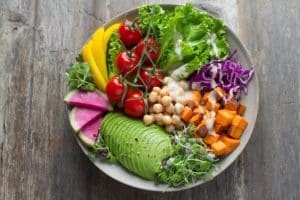In grocery stores – less dairy
Have you noticed that dairy products have come into question lately? Billboards displaying celebrities with milk mustaches are no longer ubiquitous. The dairy aisle of grocery stores now consists largely of dairy-free milks, yogurts, creamers, and even cheeses. What’s going on? Are we waking up to the fact that humans are the only mammals that drink another mammal’s milk? Are we rethinking the habit of consuming another mammal’s secretions in food and drink for the entirety of our adult lives, instead of weaning off of it at children? Is it really true that we can lower our saturated fat and cholesterol intake by choosing non-dairy products?
In restaurants, even more dairy
But hang on a second. Head into any fast food restaurants and you’ll be greeted by ads for “double cheese” on burgers, “nacho cheese” on fries, “triple cheese” on tacos, “extra cheesy” quesadillas, “cheese-stuffed” pizza crusts, a whole pound of cheese on just one pizza, extra-large dairy drinks like milkshakes and cappuccinos, and even gourmet cheeses on soups and salads! It’s very difficult to go into a fast food restaurant (or any restaurant, for that matter) and find something on the menu that doesn’t have contain any milk, cheese, sour cream, or yogurt.
The other night, during a 10-minute break on an 18-hour nursing shift, I went to a fast food drive through to pick up something quick to eat. I ordered two bean burritos with no cheese, and a side of chips with no cheese. I paid for the order and then started eating one of the burritos while driving back to work. It tasted a bit odd to me, so I turned on my overhead light and looked inside the bag of food. Both burritos had cheese in them, and my chips had a side of nacho cheese. Not only was there no choice of food on the menu without cheese, I still got cheese even though I requested “no cheese.”
What’s happening here?
It may be true that the general public is beginning to understand the health benefits of eliminating dairy. However, our fast food options, which make eating cheap, fast, and often too convenient to pass up, have either not received this message or are simply uninterested. Maybe the explanation for both of those possibilities is because our government is rewarding fast food companies for selling more dairy products. Could it be?
As of April 2, 2018, anyone eating an item off of the McDonald’s menu may be eating more dairy products than before. The slices of cheese on breakfast sandwiches and burgers just got 30% bigger. The menu of sweet coffee drinks made with dairy just got longer.
The USDA, specifically the DMI or Dairy Management Inc., is actively working in partnership with McDonald’s to increase the use of dairy in their food products. According to the Physician’s Committee for Responsible Medicine,
“DMI is funded by the USDA-managed dairy ‘checkoff’ program, which collects money from milk producers to promote and boost dairy sales. DMI spends millions of dollars a year working with fast-food restaurants to develop cheesy, high-fat products and push them on the American public.”
Sounds shocking, but it’s not a new phenomenon. In fact, Wendy’s, Taco Bell, and Pizza Hut have all had the same “assistance” from DMI.
What you can do
 Ordering something healthy from some fast food menus just got 30% more difficult, thanks to the assistance of government involvement, and most of us aren’t any wiser for it, until now. We’ve always known that fast food doesn’t support our health goals, but now that we know that the government actively contributes to the increase in disease-promoting ingredients, it’s time to fight back. How? The best way is to return to the what’s always been best for you: whole, plant-based foods.
Ordering something healthy from some fast food menus just got 30% more difficult, thanks to the assistance of government involvement, and most of us aren’t any wiser for it, until now. We’ve always known that fast food doesn’t support our health goals, but now that we know that the government actively contributes to the increase in disease-promoting ingredients, it’s time to fight back. How? The best way is to return to the what’s always been best for you: whole, plant-based foods.
Fruits, vegetables, nuts, and seeds. They often come in their own biodegradable packages, travel well, don’t need preservative or refrigeration, and contain thousands of micronutrients that our bodies crave. Keep a few of these in a small cooler, in your purse, or your car console, and the next time you’re on the road and feeling hungry, be well-prepared enough to drive right past those fast food restaurants.




2 servings
1 slice
* The % Daily Value (DV) tells you how much a nutrient in a serving of food contributes to a daily diet. 2,000 calories a day is used for general nutrition advice.